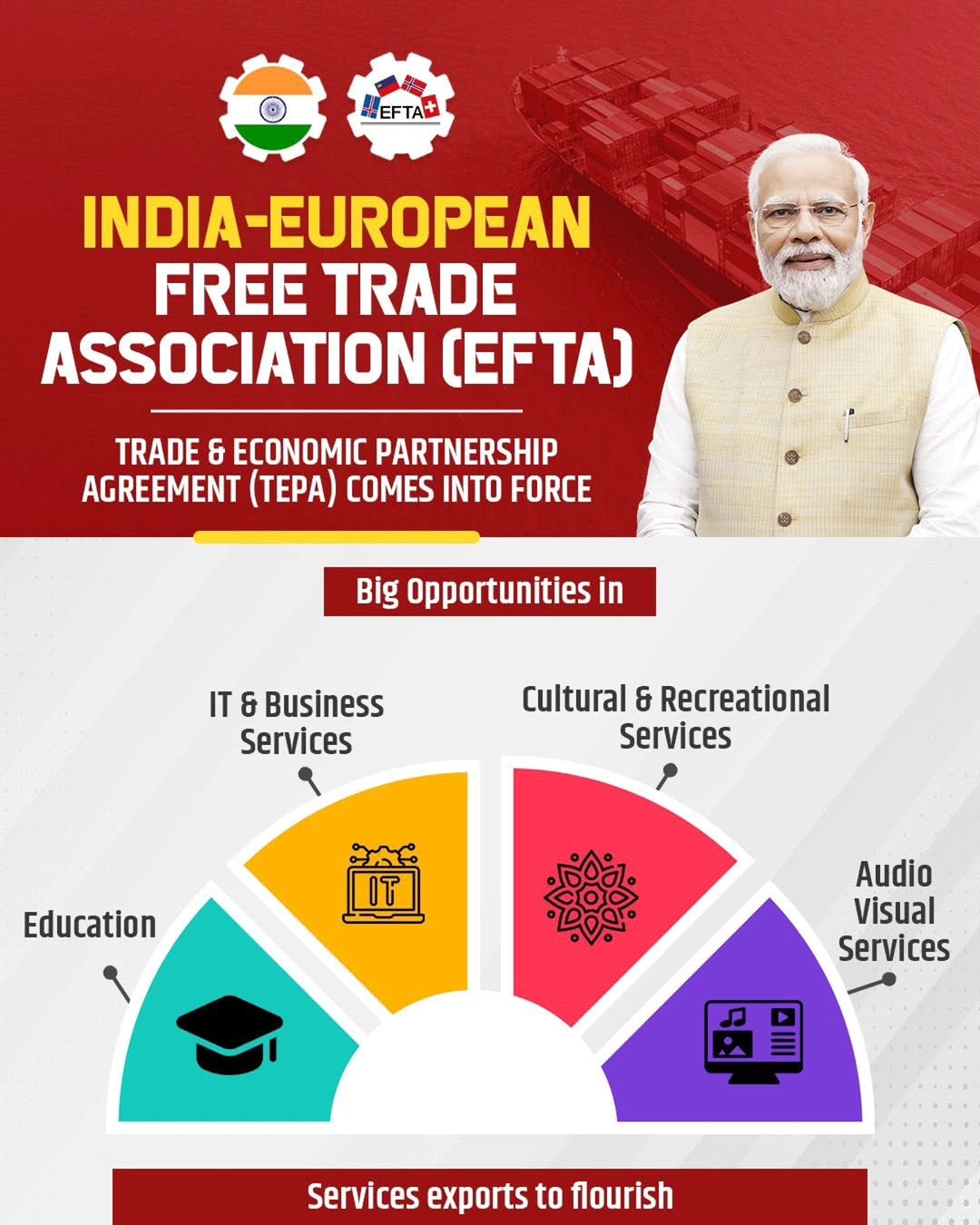Context:
The India-European Free Trade Association (EFTA) Trade and Economic Partnership Agreement (TEPA) recently came into effect on October 1, 2025, marking a significant milestone in India's trade diplomacy.
About the TEPA:
The India-EFTA Trade and Economic Partnership Agreement (TEPA) is a free trade agreement signed between India and the European Free Trade Association (EFTA) on March 10, 2024.
EFTA o Iceland, Liechtenstein, Norway, and Switzerland. The agreement aims to boost trade and investment, create jobs, and ensure market access.
Key Features of the TEPA:
1. Tariff Liberalization & Market Access
-
-
- EFTA states will eliminate or reduce tariffs on a large share of goods exported from India.
- India, in return, grants concessions on about 82.7% of its tariff lines, covering 95.3% of EFTA exports.
- However, “sensitive sectors” such as dairy, coal, and certain agricultural items remain excluded to protect domestic interests.
- EFTA states will eliminate or reduce tariffs on a large share of goods exported from India.
-
2. Investment Commitment
A standout feature is the binding investment pledge by EFTA nations of USD 100 billion over 15 years. The schedule is approximately:
-
-
- USD 50 billion in the first 10 years
- USD 50 billion in the remaining 5 years
- USD 50 billion in the first 10 years
-
3. Other Areas of Cooperation
The TEPA is comprehensive in scope, covering:
-
-
- Trade in services
- Investment promotion & facilitation
- Intellectual property rights (IPR)
- Sustainable development & trade environment
- Customs procedures, rules of origin, trade facilitation
- Dispute settlement, government procurement, competition policy, etc. Additionally, India has established a dedicated EFTA Desk (a single-window facilitation mechanism) to aid EFTA businesses setting up or expanding operations in India.
- Trade in services
-
Expected Impact & Benefits:
For Indian Economy & Industry
-
-
- Boost to Exports: Indian exporters in textiles, leather, pharmaceuticals, processed foods, and machinery could gain enhanced access to high‑income European markets. Attract Foreign Investment: With clear commitments and market access, India may see a surge in FDI, especially in sectors where EFTA firms bring advanced technology and know‑how.
- Employment Generation: The projection of 1 million direct jobs can support growth in industrial clusters and ancillary sectors.
- Boost to Exports: Indian exporters in textiles, leather, pharmaceuticals, processed foods, and machinery could gain enhanced access to high‑income European markets. Attract Foreign Investment: With clear commitments and market access, India may see a surge in FDI, especially in sectors where EFTA firms bring advanced technology and know‑how.
-
For EFTA / European Firms
-
-
- Diversification: Enhanced access to India’s fast-growing market allows EFTA firms to diversify supply chains and reduce dependence on traditional trade routes.
- Stable Framework: With legal protections, smoother dispute resolution, and investment guarantees embedded in TEPA, firms may find India a more secure destination.
- Services & Tech Linkages: Opportunities in services (finance, tech, health) and collaboration with Indian firms (esp. in software, biotech) may expand.
- Diversification: Enhanced access to India’s fast-growing market allows EFTA firms to diversify supply chains and reduce dependence on traditional trade routes.
-

Conclusion:
The India-EFTA TEPA marks a new era in trade relations between India and EFTA countries. This is India’s first Europe‑facing trade agreement with binding commitments, signalling its deeper integration into global trade architecture. The pact complements India’s efforts to negotiate FTAs with the EU, and other blocs, enhancing its strategic leverage. It also helps India present itself as an attractive nexus between developed European economies and the rapidly growing economies of Asia and Africa.








